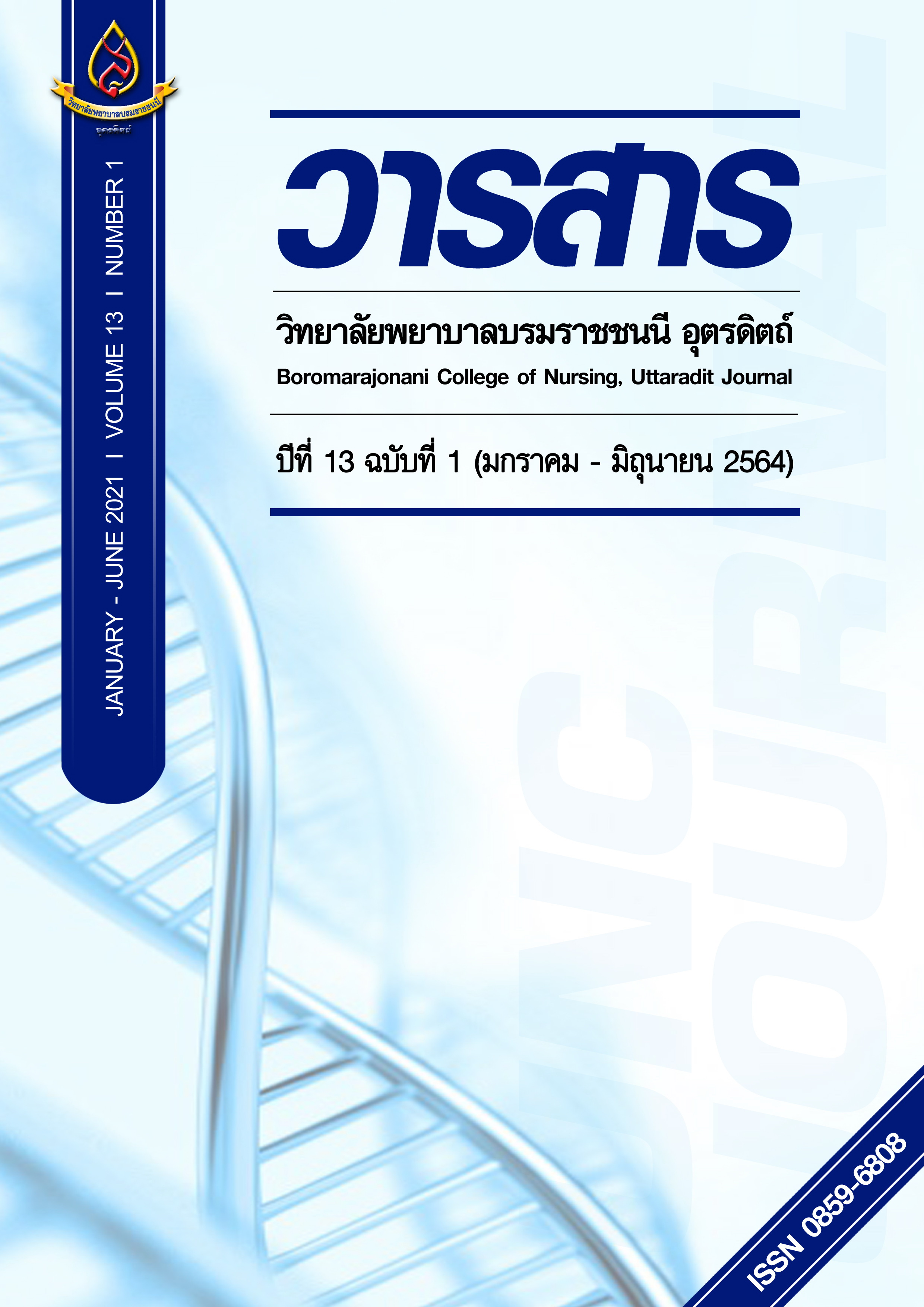การเตรียมความพร้อมญาติผู้ดูแลผู้ป่วยโรคหลอดเลือดสมอง ตามแนวคิดรูปแบบการดูแลตามระยะเปลี่ยนผ่านจากโรงพยาบาลสู่บ้าน
Main Article Content
บทคัดย่อ
โรคหลอดเลือดสมอง (Stroke) เป็นสาเหตุสำคัญของความพิการในระยะยาวของผู้ป่วย ซึ่งเป็นภาระที่ครอบครัวหรือญาติผู้ดูแลต้องให้การดูแลช่วยเหลือผู้ป่วย เนื่องจากเป็นภาวะที่เกิดขึ้นอย่างกะทันหันที่ส่งผลทำให้ญาติผู้ดูแลมักประสบกับปัญหาทั้งสุขภาพกายและสุขภาพจิต อาทิเช่น ภาวะซึมเศร้า โดดเดี่ยว และทำให้คุณภาพชีวิตลดลงด้วย ดังนั้นการจัดการปัญหาเหล่านี้จึงเป็นเรื่องที่ยากลำบากสำหรับญาติผู้ดูแลผู้ป่วยโรคหลอดเลือดสมอง บทความนี้มีจึงวัตถุประสงค์เพื่อนำเสนอแนวทางในการดูแลผู้ป่วยโรคหลอดเลือดสมองของญาติผู้ดูแล โดยกล่าวถึงประเด็นที่เกี่ยวข้องกับการดูแลผู้ป่วยโรคหลอดเลือดสมองรวมถึงบทบาทของพยาบาลในการใช้รูปแบบทฤษฎีการเปลี่ยนผ่านมาใช้ในการเตรียมความพร้อมญาติผู้ดูแลเพื่อเข้าสู่บทบาทใหม่ตามรูปแบบการดูแลระยะเปลี่ยนผ่านที่ส่งเสริมให้ผู้ป่วยและญาติผู้ดูแลได้รับการดูแลอย่างต่อเนื่อง ประกอบไปด้วย 2 ระยะ ได้แก่ ระยะที่ผู้ป่วยพักรักษาตัวอยู่ในโรงพยาบาล และระยะที่ผู้ป่วยจำหน่ายออกจากโรงพยาบาล คำแนะนำนี้จะช่วยให้พยาบาลสามารถที่จะส่งเสริมและสนับสนุนญาติผู้แล ในการดูแลผู้ป่วย และช่วยให้ญาติผู้ดูแลปรับตัวต่อบทบาทใหม่ที่ได้รับ อันจะนำมาซึ่งคุณภาพชีวิตที่ดีของผู้ป่วยต่อไป
Article Details
บทความหรือข้อคิดเห็นใดใดที่ปรากฏในวารสารวิจัยการพยาบาลและวิทยาศาสตร์สุขภาพ เป็นวรรณกรรมของผู้เขียน ซึ่งบรรณาธิการหรือสมาคมศิษย์เก่า ไม่จำเป็นต้องเห็นด้วย และบทความที่ได้รับการตีพิมพ์เผยแพร่ถือเป็นลิขสิทธิ์ของวารสารวิจัยการพยาบาลและวิทยาศาสตร์สุขภาพ
เอกสารอ้างอิง
American Stroke Association. (2019). About Stroke, 2019 Retrieved (2019, September 3) from
https://www.stroke.org/-/media/stroke-files/about-us/asm/general-asm-resources/2019-stroke-fact-sheet--approved.pdf.
Boonsin, S. & Panidchakul, K. (2016). Factors related to need of caregivers in stroke patients. Journal of Boromarajonani College of Nursing, Bangkok, 32(2), 68-80. (in Thai).
Busayarasamee, B. (2019). Needs of family caregivers of stroke patients for family care team support in Nakhonpathom municipality. Region 4-5 Medical Journal, 37(2), 192-200. (in Thai).
Bugge, C., Alexander, H. & Hage, S. (1999). Stroke patients’ informal caregivers patient, caregiver, and service factors that affect caregiver strain. Stroke 1999, 30, 1517-1523.
Chayawatto, C. (2016). Depression in the caregivers of stroke patients. Region 4-5 Medical Journal, 35(1), 14-27. (in Thai).
Chuaoupathum, R. (2010). Nursing care need of caregivers for stroke patients at home. (master’s thesis) Christian university, Bangkok (in Thai).
Hirschman, K., Shaid, E., McCauley, K., Pauly, M. & Naylor, M. (2015). Continuity of Care: The Transitional Care Model. OJIN: The Online Journal of Issues in Nursing, 20(3).
Harnirattisai, T. & Raethong, P. (2013). Perceived preparedness in caregiving among stroke’s Caregivers. Thai Science and tenhnology, 21(7), 634-639. (in Thai).
Intarasombat, P. et al., (2013). Comprehensive care of hospitalized older adults: transitional care from hospital to home. Ramathibodi Nursing Journal, 19(2), 194-205. (in Thai).
Kasemkitwattana, S, & Prison, P. (2014). Chronic Patients’ Family Caregivers: A Risk Group That Must Not Be Overlooked. Thai Journal of Nursing Council, 29(4), 22-31. (in Thai).
Ketvatimar, M. (2017). The roles of professional nurses in the management of stroke patients. Journal of health science research, 11(2), 71-80. (in Thai).
Kositamongkol, S., Pinyopasakul, W. & Kongkar, R. (2016). Nursing care for stroke patients. Bangkok: Mahidol University. (in Thai).
Longphasuk, N., Monkong, S. & Sirapo-ngam, Y. (2018). Health conditions and self-care activities of older caregivers caring for bedridden older adults. Thai Journal of Nursing Council, 33(2) 97-109. (in Thai).
Moonthee, W., Monkong, S., Sirapo-ngam, Y. & et al., (2016). Impact of transitional care programme and family caregivers on stroke patients’ routine activity performance, complications, and satisfaction. Thai Journal of Nursing Council, 31(1), 95-110. (in Thai).
Naylor, M. D. (2004). Transitional care model. Retrieved (2012, November 11) from http://ftp.ipro.org/index/cmsfilesystemaction/care/learning1/transitional_care_model.pdf.
Naylor, M. D., Brooten, D., Campbell, R., Jacobsen, B. S., Mezey, M. D., Pauly, M. V., & Schwartz, J. S. (1999). Comprehensive discharge planning and home follow-up of hospitalized elders: A randomized clinical trial. The Journal of the American Medical Association, 281(7), 613-620.
Paksee, N., Sirapo-ngam, Y., Monkong, S. & Leelacharas, S. (2016). Effects of a transitional care program for stroke patients and family caregivers on caregiver’s preparedness, stress, adaptation, and satisfaction. Ramathibodi Nursing Journal, 20(1), 65-80. (in Thai).
Petchroung, N., Priyatruk, P. & Thongkeang, V. (2013) . The study of continuing care for patients with cerebrovascular disease in primary care unit. Journal of The Royal Thai Army Nurses, 14(1), 25-33. (in Thai).
Phothidara, Y., Korcharoenyos, C., Somkumlung ,P. & Chaiyasit, Y. (2014). Factors effecting on fatigue in strokes’ caregiver. Journal of Nursing Science and Health, 37(3), 46-55. (in Thai).
Prombut, P., Piaseu. N., & Sakulhongsopon S. (2014). Factors related to stress of family caregiver of patients with stroke at home. Ramathibodi Nursing Journal, 20(1), 82-96. (in Thai).
Ritithada, S. & Taraput, C. (2018). How to take care of patients with stroke. Journal of Thai Stroke Society, 17(2), 25-40. (in Thai).
Saengmanee, S., Arpanantikul, M. & Sirapo-ngam, Y. (2012). A case study: adaptation of a working caregiver to a stroke patient. Ramathibodi Nursing Journal, 18(1), 119-133. (in Thai).
Seesawang, J. & Rungnoei, N. (2016). Nursing care for stroke patients: strategies towards patient-centered care. Journal of Nursing Science, 34(3), 10-18. (in Thai).
Senadisai, S. & Prapaipanich, W., (2011). Basic nursing: concept and practice. Bangkok: Ramathibodi School of Nursing. (in Thai).
Senasana, S., Komjakraphan, P. & Isaramalai, S. (2017). Development of the home-based skill training program for caregivers of stroke patients. Journal Journal of Preventive Medicine Association of Thailand, 7(2), 212-222. (in Thai).
Thongcharoen, V. (2015). The art and science of gerontological nursing. 2nd ed. Bangkok; Faculty of Nursing Mahidol University. (in Thai).
Thongthawee, B. et al., (2018). Family members’ experience in providing care for persons with stroke: a phenomenological study. Songklanagarind Journal of Nursing, 38(3), 179-191. (in Thai).
Waeharasin, C. (2017). Nursing inteventions for familes experimencing chronic illness. Chonburi: Chonburiprinting. (in Thai).
Yotsurin, P., Tancharoen, P. & Rajchawail, N. (2020). Family-centered care: transforming knowledge to practice for preparing caregivers of stroke patients. Journal of Health Sciences Scholarship, 7(1), 131-141. (in Thai).


